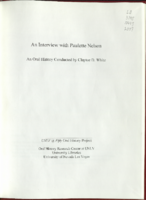Search the Special Collections and Archives Portal
Search Results
Carolyn V. Hamilton Papers
Identifier
Abstract
The Carolyn V. Hamilton Papers (1966-2024) consist of advertisements, press releases, correspondence, newspaper articles, awards, and event programs. The materials primarily document Hamilton’s work as a graphic designer and advertising executive in Las Vegas, Nevada from the early 1980s into the 2000s. Some of the materials in this collection pertain to the late comedian Cork Proctor, Hamilton’s former spouse, including performance advertisements and magazine articles.
Archival Collection
William Flangas Scrapbooks
Identifier
Abstract
The William Flangas Srapbooks document his anti-smoking efforts in Nevada from 1974 to 2014. These materials include correspondence, articles, copies of assembly bills, newsletters related to smoking and health, and newsletters related to non-smokers.
Archival Collection
Stella Champo Iaconis Papers
Identifier
Abstract
The Stella Champo Iaconis Papers consist of a certificate for proficiency in Rapid Legible Business Writing from the Palmer Method of Business Writing given on May 11, 1927; a certificate of promotion to high school in Clark County, Nevada dated May 25, 1927; and an autograph book signed by classmates at Las Vegas High School in Las Vegas, Nevada in 1928.
Archival Collection
Kenneth Giles Professional Papers
Identifier
Abstract
The Kenneth Giles Professional Papers (1964-2001) contain documents and visual material related to Giles's time as an Environmental Radiation Monitor for the Environmental Protection Agency (EPA) at the Nevada Test Site (NTS). Photographic slides, film, and digital images depict the general flora and fauna throughout the area surrounding the NTS. Visual materials also document specific mule deer and steer surveillance and testing at the EPA Farm located within the NTS. The collection also contains environmental reports written or collected by Giles, government documents, pamphlets, and newspaper clippings related to environmental monitoring and Giles's work at NTS. A small portion of the collection documents his brief role providing monitoring support at Three Mile Island in Pennsylvania in 1979. Note: Some images may be of a graphic or disturbing nature and may not be suitable for some users. Photographs may contain scenes of animal testing or other objectionable imagery.
Archival Collection
Eileen Brookman Papers
Identifier
Abstract
The Eileen Brookman Papers date from 1934 to 2002 and document Brookman's personal life and political career. Brookman was active in the Las Vegas Jewish community. Personal papers include programs from B'nai B'rith, scrapbook materials, correspondence, and photographs. The collection includes documentation from the White House Conference on Aging. She served several terms in the Nevada State Assembly from 1967 to 1977 and again from 1987 to 1989. Political materials include legislative information, bumper stickers, election returns, and newspaper clippings.
Archival Collection

Transcript of interview with Juanita Kilburg by Vincente C. Camacho, March 7, 1981
Date
Archival Collection
Description
On March 7, 1981, Vicente C. Camacho interviewed accounting clerk, Juanita Kilburg (born September 25th, 1923 in Los Angeles, California) on the second floor of the UNLV Dickinson Library. Kilburg explains how her family first moved to Southern Nevada and her father’s ties to the railroad. She then goes on to explain the growth of the military and Nellis Air Force Base. The interview concludes with a discussion on her work with the American Legion service organization.
Text

Transcript of interview of Thalia Dondero by Mary Germain, March 13, 1976
Date
Archival Collection
Description
On March 13, 1976, Mary Germain interviewed Thalia Dondero (born 1921 in Greeley, Colorado) about her life in Nevada and her experiences as the first female commissioner for the Clark County Commission. Dondero first talks about her upbringing and her eventual move to Southern Nevada. She also discusses her involvement in extracurricular activities, such as being a leader for the Girl Scouts, and how some of those experiences led her to get involved in politics. Dondero also mentions her work with National Geographic and her passion for working with oil paintings and watercolors. The final part of the interview involves some of Dondero’s accounts as a commissioner for Clark County and some of the challenges she has faced in that position.
Text

Transcript of interview with Linda Hartley by Pauline Marchese, March 10, 1978
Date
Archival Collection
Description
On March 10, 1978, Pauline Marchese interviewed her neighbor, Linda Hartley (born in 1941, in Cedar City, Utah) in her home at 5261 South Jane Way, Las Vegas, Nevada. During the interview, the two discuss Hartley’s personal history, such as schools that she had attended and her recollection of local recreational activities. The two go on to talk about changes in crime, the environment, and briefly discuss a variety of issues at the time, including: segregated schools, prostitution, and effects of the Nevada Test Site.
Text

Transcript of interview with Dr. Catherine Bellver by Caryll Batt Dziedziak, November 13, 1995
Date
Archival Collection
Description
Dr. Catherine Bellver is a woman with tenacity. How else could one describe her drive to create the Women's Studies Program spanning fifteen years? As a faculty member in the Department of Foreign Languages, Dr. Bellver first joined the Women's Studies steering committee in 1979. In the following decade, the committee oversaw the formation of the Women's Studies Program, including: procuring administrative and faculty support, creating bylaws and course criteria, critiquing proposed cross-listed courses, and selecting course offerings. During that period she also worked with a volunteer group to create and staff the first Women's Center on campus. In the early Nineties, she played an instrumental role in the presentation of four public colloquia that addressed key issues pertaining to women. Dr. Bellver acted as interim director of the Women's Studies Program while overseeing the search for a permanent director. She continued to remain involved with the Women's Studies program, serving as faculty member on several committees. She has also worked in the Women's Caucus on the regional and national levels of the Modem Languages Association Dr. Bellver is currently Distinguished Professor of Spanish in the Department of Foreign Languages at the University of Nevada, Las Vegas. Her work has appeared in journals such as Anales de la Literature Espanola Contemporanea, Hispanic Review, Hispanofila, Insula, Journal of Interdisciplinary Studies, Monographic Review/Revista Monografica, Revista de Estudios Modernos, Revista Hispanica Moderna, Romance Notes and Romanic Review. Dr. Bellver's participation in the creation of the Women's Studies Program illustrates how critical institutional and social progress can result from the commitment of a determined group of individuals. Her decades of involvement in creating an academic arena for the study of women and gender issues underscores the significance of women's contributions to the history of Las Vegas. In addition to the history of the Women's Studies Program at the University of Nevada Las Vegas this interview contains information regarding the creation of the first Women's Center on campus.
Text

Transcript of interview with Paulette Nelson by Claytee D. White, March 2, 2009
Date
Archival Collection
Description
Text
